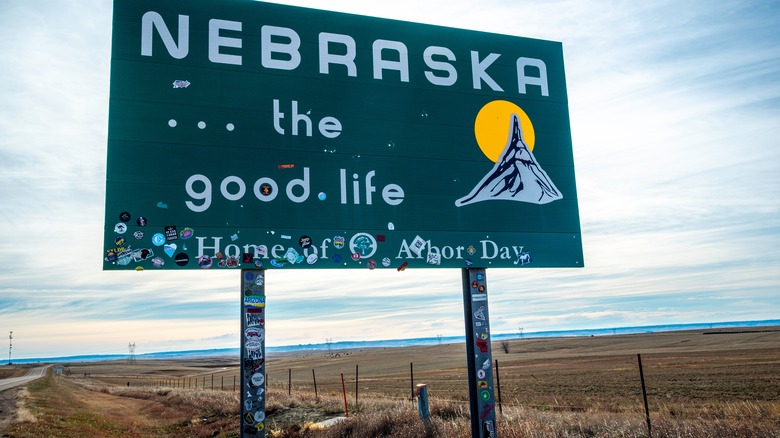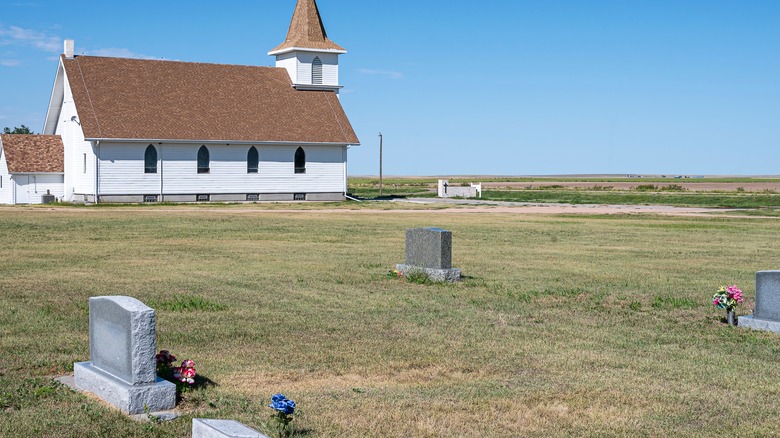Weirdest Laws In Nebraska
In a region of the central Midwest lies Nebraska. It entered the union in 1867 and became the 37th state (via History). The state is known for its thriving farming and agricultural industry and produces a significant percentage of the country's corn, soybeans, and wheat, among other things, says Crop Watch. Also, it's not called the Tree Planters' state for nothing; Nebraska is where Arbor Day was proclaimed (via Arbor Day).
It is the fourth-largest state geographically in the Midwestern region, and ranks eighth in terms of population there, says World Population Review. Nebraska is known for being the home of the Reuben sandwich (per What's Cooking America), the birthplace of Kool-Aid (History Nebraska), and has the unique distinction of being the only triple landlocked state in the country, per Visit Omaha. This means getting to the nearest ocean or gulf from Nebraska will take the trek of going through three states — no matter which direction (north, south, east, or west).
With a population of 1,963,692 people (via Census), close to a quarter of that population lives in the city of Omaha — the state's largest city. All of these residents are governed by a state legislature, which has some weird laws Nebraskans have to abide by.
No marriage for people with a sexually transmitted disease
One of the weirdest laws on the books of Nebraska's state legislature is one that excludes people with sexually transmitted diseases (STD) from getting married. The state considers all STD's to be contagious and a grave threat to public health, per its website. It might sound reasonable in terms of containment, but what does that have to do with wanting to walk down the aisle?
For years now, the law specifies that you can't marry in the state if you have venereal disease, or what is known as today known as an STD or STI. It came into law in 1944 when a man brought forth a case that claimed his wife gave him a disease. He wanted a divorce, and his marriage was voided as a result. "Marriage of one afflicted with venereal disease is not void but voidable," the state legislature declared.
If someone has an STD and keeps their status from their partner, they cannot void the marriage. "Where party afflicted with venereal disease enters into marriage with full knowledge thereof, such party is barred from seeking annulment," per the Nebraska Legislature. The law comes across as discriminatory, and it's also outdated, as now we know that some diseases can lie dormant before they reveal themselves in symptoms or tests, says Very Well Health. But, it's still a law.
Drunk flying
Driving drunk anywhere in the U.S. is considered a crime, and it becomes a federal one if done on federal property. So obviously, it's a well-known offense most people know they'll be in trouble for if they get caught doing it. But there are also nuances to what qualifies as drunk. Drunkenness is measured by blood alcohol concentration (BAC), and anything more than the legal 0.08% BAC is illegal for driving. Like every other state, Nebraska enforces this law (via Nebraska State Legislature).
If you can't manage a vehicle at the highest drunken level that is legal, then the same would apply to flying a plane too, right? Yes, the Federal Aviation Authority (FAA) is tougher in that regard. The legal BAC for plane-flying is half the one set for driving, at 0.04%. But weirdly, not in Nebraska. Apparently, state law says it is illegal to fly any aircraft with five-hundredths of one percent of alcohol in your body, or 0.05%. What difference does that single decimal change make from one set by the FAA? Is this Nebraska's weird way of trying to deviate from the agency? Either way, you will be severely punished for committing the crime.
What's a donut without a hole?
Sure, donuts come in a variety of sizes and shapes, but they are more so recognized for being a circle with another empty circle in the middle of it — otherwise known as a donut hole. If a donut is hole-less, it's likely because it has some filling. But you might be surprised if you went to the village of Leigh, Nebraska, and ate a donut there with or without nothing at all inside of it.
Even though it's no longer in effect, a pre-existing law on the books of the small village prevented the sale of donuts with holes for more than a century, per Only in Your State. Just a few years into being a state, Nebraska decided to ban donut holes in 1887. It would be in effect until 1997, when it was repealed. Yet, it came with a cost. As a result of the law, people grew up in this town without experiencing donuts with holes. So even years after its reversal, finding a holed donut in Leigh is an adventure because when they arrive, they sell out quickly, per Columbus Telegram. It's almost as if it might as well be a law.
Mixing your alcohol
Going to any bar, you can expect that a lot of liquor mixing is going down — both behind the bar and whatever the patron is purchasing. Serving mixed alcoholic drinks is extremely common, and cocktails are the most normal way people enjoy the mixing of liquor. Although in Nebraska, they are quite specific about certain alcoholic mixtures and created a law against one form. Apparently, if you ever wanted a drink that combines beer and liquor, it's a no-go in the state, per ABC News. But that doesn't mean a bartender won't serve it to you. The law was written but is never enforced.
There are so many types of beer cocktails, along with the custom of getting a shot followed by a beer. It's unheard of that this hasn't also been a practice in Nebraska, like everywhere else. Over a decade ago, Nebraskan lawmakers were working on repealing the law that apparently came out of the Prohibition era and meant to prevent spiking, says ABC News.
Owning land near old cemeteries
Normally, someone on your property that you didn't invite is considered a trespasser. In Nebraska, it really depends on what type of property you own. Per the Nebraska State Legislature, if you happen to own some land that also houses a pioneer cemetery, you have to let the public have access. These earliest known burial locations can be reached by any pedestrian that is walking near the cemetery or wants to gain access to it.
The law details that the landowner can create a path specifically to the cemetery to ensure easier access, or to simply direct anyone who's legally on your property. However, there are certain times of the year this can be done. They can only do so on Memorial Day and between November 1 and March 1. Any other time, it is recommended that anyone accessing a cemetery should alert the owner of their presence.





